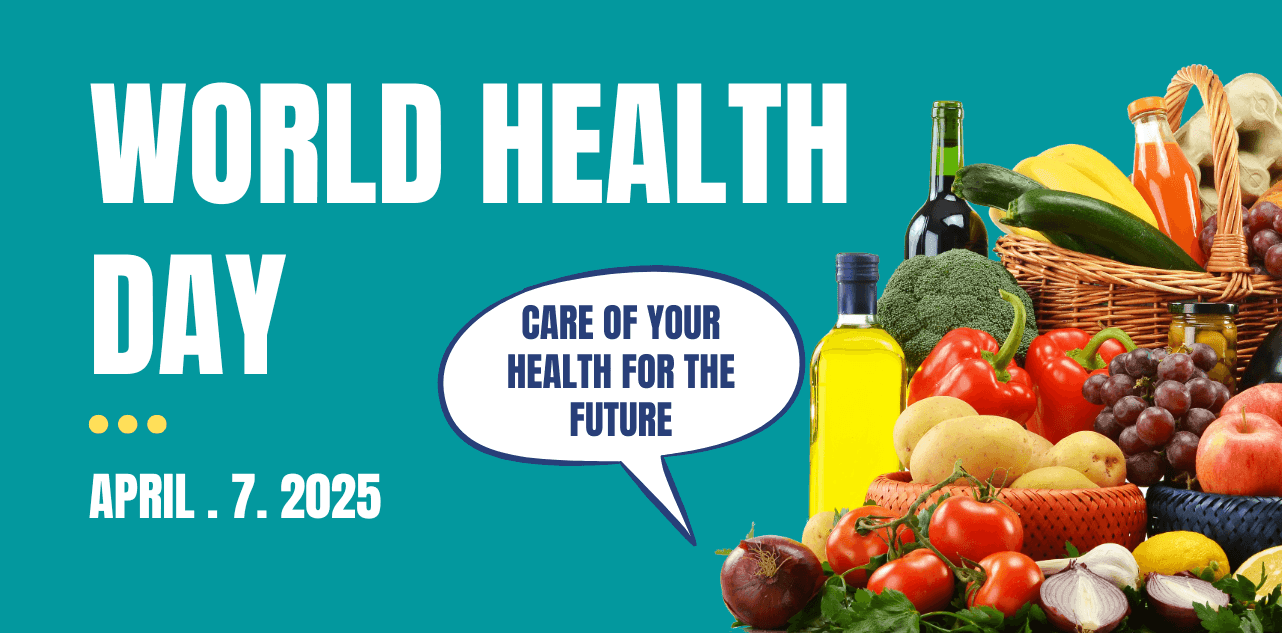Friday 16 January 2026
Good Health is the Foundation of every Thriving Society
Share

World Health Day is celebrated every year on 7 April under the auspices of the World Health Organization. The World Health Organization was convened by the First World Health Assembly in 1948. In 1950, the First World Health Assembly decided that World Health Day should be celebrated every year on 7 April. This day is used to celebrate the founding anniversary of the World Health Organization and to bring global attention to any global health issue.
This year's theme, “Healthy Beginnings, Hopeful Futures,” highlights the critical role of maternal and newborn health in shaping long-term well-being. WHO champions health and a better future for all.
Dedicated to the well-being of all people and guided by science, the World Health Organization leads and champions global efforts to give everyone, everywhere an equal chance to live a healthy life. It is the United Nations agency that connects nations, partners and people to promote health, keep the world safe and serve the vulnerable – so everyone, everywhere can attain the highest level of health.
WHO leads global efforts to expand universal health coverage. It directs and coordinates the world’s response to health emergencies. And, it promotes healthier lives – from pregnancy care through old age. Its Triple Billion targets outline an ambitious plan for the world to achieve good health for all using science-based policies and programs.
Working with 194 Member States across 6 regions and on the ground in 150+ locations, the WHO team works to improve everyone’s ability to enjoy good health and well-being. Collaboration is at the heart of all it does. From governments and civil society to international organizations, foundations, advocates, researchers and health workers; it mobilizes every part of the society to advance the health and security of all.
WHO offers a diverse, multicultural environment for professionals seeking to advance health as a basic human right.
Healthy movement may include walking, sports, dancing, yoga, running or other activities you enjoy. Eat a well-balanced, low-fat diet with lots of fruits, vegetables and whole grains. Choose a diet that's low in saturated fat and cholesterol, and moderate in sugar, salt and total fat.
The Prime Minister of India, Narendra Modi has reaffirmed commitment to build a healthier world on World Health Day. Modi shares that government will keep focusing on healthcare and invest in different aspects of people’s well-being. Good health is the foundation of every thriving society.
PM Modi wrote on X;
“On World Health Day, let us reaffirm our commitment to building a healthier world. Our government will keep focusing on healthcare and invest in different aspects of people’s well-being. Good health is the foundation of every thriving society!”
On World Health Day, let us reaffirm our commitment to building a healthier world. Our Government will keep focusing on healthcare and invest in different aspects of people’s well-being. Good health is the foundation of every thriving society! pic.twitter.com/2XEpVmPza9
— Narendra Modi (@narendramodi) April 7, 2025
Narendra Modi on X: "On World Health Day, let us reaffirm our commitment to building a healthier world. Our Government will keep focusing on healthcare and invest in different aspects of people’s well-being. Good health is the foundation of every thriving society! https://t.co/2XEpVmPza9" / X
World Health Day is being celebrated across the globe, today, to raise awareness about health and good health practices. The WHO has declared ‘healthy beginnings, hopeful futures’ as the theme this year to end preventable maternal and newborn deaths and to prioritize women’s longer-term health and well-being.
Additionally, it will urge governments and the healthcare community to intensify efforts to eliminate preventable maternal and newborn deaths and to line up the long-term health and well-being of women, with the WHO and its partners also disseminating valuable information to support healthy pregnancies, safe births, and improved postnatal health.
The day is marked by a variety of activities and events, including public lectures, health campaigns, and community outreach programs. Governments and organizations around the world also use the occasion to launch new health initiatives and programs.
In an exclusive interview with “Akashvani News”, Minister of State for Health and Family Welfare Anupriya Patel highlighted the nation’s commendable achievements in the health sector, including the significant fall in maternal and infant mortality ratios. She also appealed to everyone to adopt a healthy lifestyle.
Maternal health refers to the health of women during pregnancy, childbirth and the postnatal period. Each stage should be a positive experience, ensuring women and their babies reach their full potential for health and well-being.
Although important progress has been made in the last two decades, about 287 000 women died during and following pregnancy and childbirth in 2020. This number is unacceptably high.
The most common direct causes of maternal injury and death are excessive blood loss, infection, high blood pressure, unsafe abortion, and obstructed labor, as well as indirect causes such as anemia, malaria, and heart disease.
Most maternal deaths are preventable with timely management by a skilled health professional working in a supportive environment.
Ending preventable maternal death must remain at the top of the global agenda. At the same time, simply surviving pregnancy and childbirth can never be the marker of successful maternal health care. It is critical to expand efforts reducing maternal injury and disability to promote health and well-being.
Every pregnancy and birth is unique. Addressing inequalities that affect health outcomes, especially sexual and reproductive health and rights and gender, is fundamental to ensuring all women have access to respectful and high-quality maternity care.
Newsletter
Stay up to date with all the latest News that affects you in politics, finance and more.